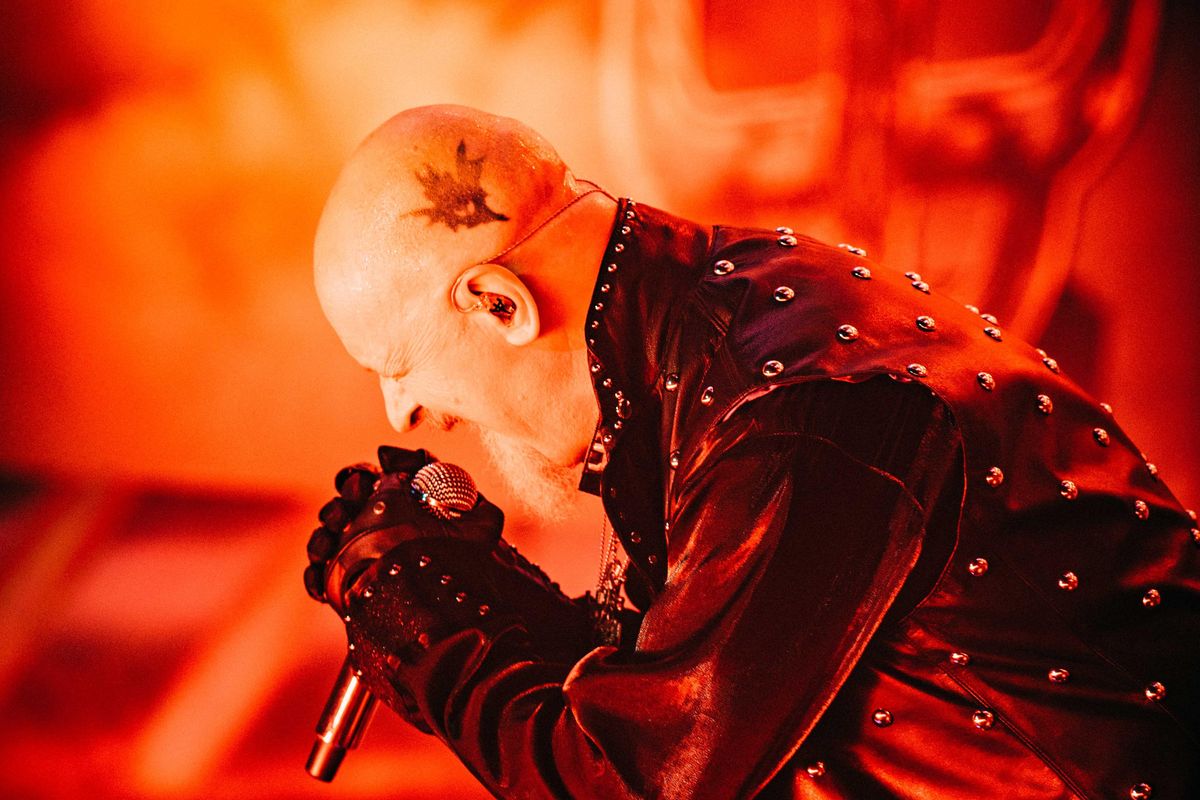With the return of Judas Priest to Spokane area, iconic rock band will show it’s aging gracefully

OK, the band’s name is a little ominous. If you’re not a fan, it probably even sounds a bit evil. You likely have thoughts of screamingly loud guitars and head-to-toe black leather. Let’s throw in some spikes, just for good measure.
In hindsight, it’s almost comical to remember just how freaked out people used to be about Judas Priest.
Especially in the 1980s. About a band founded in England in 1969, during the era of Flower Power. Whose lead singer is 67 years old. And loves to post photos of himself on social media with kittens.
Even one of the band’s most famous songs, 1980’s “Breaking the Law,” is considered enough of a non-offensive classic rock staple that it’s not unusual to hear it on a Tuesday evening at your local Rosauers. Because that just happened. Last week. On the South Hill.
The good news is that if you’re craving some well-seasoned rock ’n’ roll from metal’s masters, it won’t take a serendipitous trip to your local market’s produce department. Judas Priest, who hasn’t played in Spokane in almost three decades, makes its return to the region with a show at Northern Quest on Wednesday.
You’ve got another thing comin’ if you think it was just select parts of the world that were stressed out by the self-proclaimed Defenders of the Faith. There was plenty of hand-wringing here in Spokane, as well.
Judas Priest was one of the bands targeted on Capitol Hill by a high-profile committee – the Parents Music Resource Center – in the mid-’80s as having one of the “Filthy Fifteen” songs proving that music needed to be rated similarly to major motion pictures. In 1990, a suit filed in Nevada alleged that one of the band’s albums from the 1970s included subliminal messages that prompted two young men to enter a suicide pact.
Of course, the band was cleared in the court case, and the PMRC has since become a punchline.
In Spokane, the band’s notoriety was actually blamed for the 1986 failure of a city occupation tax aimed at building a new arena. The local election was shortly after a tension-filled concert at the old Coliseum that followed a fatal stabbing at a Judas Priest concert in Tacoma.
In a Spokane Chronicle article from May 21, 1986, local voters said along with problems created by the Judas Priest concert, the city needed to focus on fixing its potholes first – proving that the more things change, the more they stay the same. Except for Judas Priest. Or at least the band’s image.
Judas Priest has made the transition from seemingly reviled to lovingly revered rather gracefully. And it happened by staying true to the things they’ve always done.
The band’s latest album – 2018’s “Firepower” – was not only a critical darling, making several publications’ lists of the year’s best albums, it also became Judas Priest’s highest charting album ever, peaking at No. 2 on Billboard’s album charts.
There was even a glowing story about the band’s renaissance in the Wall Street Journal. The heavy metal heroes had returned to the big time in a big way.
The band has continuously recorded albums and toured, being mostly embraced by Priest’s hardcore fans over the past couple of decades. That changed with “Firepower.” As lead singer Rob Halford is fond of saying at the beginning of most of the band’s concerts, “The mighty Priest is back.”
The unlikely lovefest happened when the band reached out to British producer Andy Sneap, who has a reputation for helping ’80s hard rock bands rediscover their metal mojo. He does that, in part, by reminding them of what made them great in the first place.
It worked in a big way with Judas Priest.
Critic Josh Gray wrote that with the band’s latest album, “… as far as I can tell, Judas Priest just woke up one morning and suddenly remembered how to be the greatest heavy metal band on the planet again.”
But the resurgence has been bittersweet.
Founding Judas Priest guitarist Glenn Tipton was diagnosed with Parkinson’s disease in 2008. He still worked with the band and was one of the primary songwriters on “Firepower” LP, but when it came time to tour, he felt he couldn’t do all he needed to do.
Of course, the band plans to play that song during their return to Spokane.
Since the band’s return to the road this spring, the setlist has changed dramatically to include many deep cuts spanning 12 albums, including several songs the band hasn’t performed in decades. Reviews of these shows have been some of the best in the band’s career.
Halford told the Edmonton Journal earlier this month that despite what others projected on the band, Judas Priest has always focused on the good fight, especially when the good fight means fighting for peace in our polarized world.
“If you look across the board at everything Priest has done, much of it contains a positive, constructive, uplifting message,” Halford explained. “That’s just part of our mantra.”
And when you’re almost a septuagenarian, does that mantra still include a little law breaking?
“I get asked, ‘How many times can you still do ‘Breaking the Law’ and still enjoy it’ and the answer is ‘2 million,’ ” Halford recently told the Albany Times Union. “When I’m singing that, it’s a microcosm of a moment in time and performance. Some of these songs, not just Judas Priest but metal and rock music, are treasures.
“Fans have a right to hear them performed,” he said. “And without fans, you got nothing.”